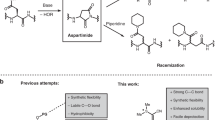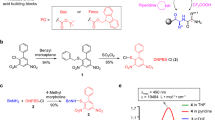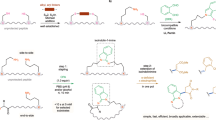Abstract
IN order that a blocking substituent may be utilized for masking the amino function of an amino-acid used in peptide synthesis, it must satisfy a number of requirements. These include the ready availability and stability of the derivatives which incorporate the blocking substituent, and the selective removal of the protecting group under conditions that will not lead to racemization or destruction of the labile peptide molecule.
This is a preview of subscription content, access via your institution
Access options
Subscribe to this journal
Receive 51 print issues and online access
$199.00 per year
only $3.90 per issue
Buy this article
- Purchase on Springer Link
- Instant access to full article PDF
Prices may be subject to local taxes which are calculated during checkout
Similar content being viewed by others
References
Schwarzenbach, G., and Felder, E., Helv. Chim. Acta, 27, 1701 (1944).
Wieland, T., and Schäfer, W., Ann., 576, 104 (1952).
Author information
Authors and Affiliations
Rights and permissions
About this article
Cite this article
HALPERN, B., JAMES, L. A New Amino Protecting Group for Amino-acids in Peptide Synthesis. Nature 202, 592–593 (1964). https://doi.org/10.1038/202592a0
Issue Date:
DOI: https://doi.org/10.1038/202592a0
Comments
By submitting a comment you agree to abide by our Terms and Community Guidelines. If you find something abusive or that does not comply with our terms or guidelines please flag it as inappropriate.



